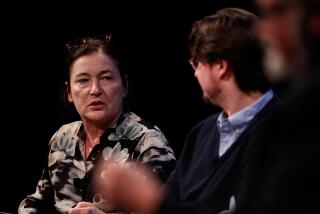Book Review : Men Get No Respect in Oakley Novel
- Share via
The Men’s Room by Ann Oakley (Atheneum: $18.95; 309 pages)
As if Charity Walton didn’t have her work cut out for her with a husband, four children, a lover and her work as a university sociologist, she’s obliged to function as an Everywoman of the liberation movement, living out every swing in attitude from 1968 to the year 2000. Charity is a sort of feminist Vicar of Bray. When the social climate dictates marriage and motherhood, she obliges with Tom, the twins Harry and Dan, and finally Rachel, all of whom, “taken as a package, represented their mother’s first understanding of her place in the world.”
When the mood switched to finding an individual identity, Charity acquired a profession; when she was told to seek sexual fulfillment, she latched onto Mark Carleton, the new star of her department, a womanizer first and an ethnomethodologist second. Though we never learn much about this particular branch of the discipline, we know that Carleton has just returned to London after a disappointing sojourn in Texas, where “they had liked his tweed jacket and his accent, and had some respect for his superlative lack of interest in the undergraduate teaching he was hired to do, but they had never really understood what he was on about.”
Never mind. Carleton’s real job is philandering.
Token Resistance
The book begins in 1980, the day Carleton arrives to take up his new post. Though until now, Charity has been a model wife for 12 years to James Walton, she sheds him as easily as slipping off a pair of pumps. Offering only token resistance, Walton bows out of her life gracefully, resurfacing from time to time only to demonstrate that men have no trouble finding new wives and families.
Carleton is married to Jane, a presence as shadowy as James, though considerably more tenacious and convenient. Jane provides Carleton with a reason not to marry Charity, a circumstance that soon ceases to matter much. Because this is a sexual odyssey, Charity moves briskly on to ever-increasing independence. Free at last from the niggling demands of an in-house husband, she rises rapidly in her profession, mothering her children efficiently without male interference; becoming in the process one of the most sexually accomplished women in contemporary English fiction.
While Carleton never forsakes his wicked ways, each time he strays, Charity becomes not only sadder and wiser but stronger and tougher. When his loyal Jane finally divorces him and he’s free to marry Charity, she flatly refuses, having long since realized that marriage is a far more advantageous arrangement for men than for women.
Detached, Ironic Tone
A leading British feminist, Oakley has written several fierce nonfiction works exploring the disparity in sexual roles. In this novel, her first, she has adopted a detached and ironic tone that serves her purpose splendidly. While we never quite forget that Charity is a paradigm, we enjoy her despite the fact that her life is designed to show the fallacies built into radical feminist literature. One way and another, the various secondary characters reinforce the point. Sally, Charity’s counterself, represents the new woman, untrammeled by husband or children, but eventually she succumbs to her own biological imperative, with unhappy results. Though Sally is treated sympathetically, the other female characters tend to be as extreme and as absurd as the ideologies they embody.
The men, without exception, are unregenerate and irredeemable; the ‘men’s room’ of the title is a prison in which the inmate wanders around “with his hands in his pockets, looking at his feet and mumbling to himself, quite insentient of other rooms, ways of walking and forms of mumbling. . . . As caged lions, men saw the diameters of their cages and mistook them for the cavernous spaces of the earth--unconstrained, untainted, inviting, and likely to be bathed in sunshine, always.” Besides the nonentity James and the phallocentric Carleton, the male cast includes an embezzler and a kleptomaniac who regards stealing as “participatory sociology.”
In Oakley’s jaded view, there will always be an abyss between the ideal and the reality of true equality. Though her doughty and resilient heroine triumphs in the end, Charity Walton is an exception.
More to Read
Sign up for our Book Club newsletter
Get the latest news, events and more from the Los Angeles Times Book Club, and help us get L.A. reading and talking.
You may occasionally receive promotional content from the Los Angeles Times.









